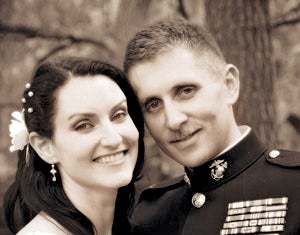A Swashbuckler and Servant of His Country
Michael Weston ’97, special agent with the Drug Enforcement Administration, died in a helicopter crash in Afghanistan on Oct. 26, 2009, while working with the U.S. military to fight drug trafficking in the region. In addition to his J.D., he held a joint degree in computer science and economics from Stanford University. He and Cynthia Tidler ’97 had married five months earlier (photo). “He had the ability to do anything,” she told The National Law Journal in a Nov. 9 story. “He’d seen the worst parts of the world and the worst parts of human nature, but he tried to do the right thing all the time.”
Tidler, now widowed for the second time, had been married earlier to Helge Boes ’97, who was killed in Afghanistan in 2003. A tribute to Boes written by Weston—his friend and classmate—appeared in this magazine.
Robert Bracknell LL.M. ’06, lieutenant colonel, U.S. Marine Corps, wrote the following about Weston.
A career Drug Enforcement Administration agent and reserve Marine Corps major, Mike Weston was a man of action. After graduating from Harvard Law in 1997, he struck out for Quantico, Va., to test his mettle with the U.S. Marines. Mike served with me at Camp Pendleton, Calif. We became fast friends and co-counsel, before his first combat deployment to Iraq in 2003. He was brilliant, funny, irreverent, loyal, kind, and dedicated in a way few can understand, and even fewer could emulate. He was, as he said of another friend who also gave his life in Afghanistan, “the best of us.” It quickly became apparent to Mike that being an attorney was not enough to quench his thirst for adventure. When he left active duty to join the DEA, it was not as counsel or as an administrator, but as a special agent. He knew that occasionally sitting behind a desk was a necessary evil to accomplish his true passion: undercover operations and felony warrant service—weapons drawn, body armor donned, just like on television. Except that this was real life, real danger, real service—keeping imported poisons off the streets. His profession delighted him through and through.
Mike twice interrupted his DEA career to return to service again with the Marines—first as a riverine unit commander in the Al Anbar province of Iraq, and later as the second-in-charge of a combat engineer company. In early 2005, I ran into him in one of the most Godforsaken places on earth—the western desert of Iraq. I was leaving my first combat tour and he was inbound. His irrepressible humor and positive outlook were on display over those few days, despite the fact that he was facing a seven-month deployment in the teeth of a deadly insurgency. We played poker late into the night, watched “Old School” three or four times, laughed a lot and said goodbye. We talked again on the phone some months later, after he had returned from Iraq—and had just kayaked the Mississippi from the headwaters to the delta—and again as he prepared for his Afghan deployment.
Mike was a swashbuckler, an extraordinary friend, and a servant of his country and mankind. Three hundred years ago he might have been a pirate, or he might have captured Edward Teach himself. Two hundred years ago, it might have been Lewis, Clark and Weston.
I loathe the inappropriate use of the term “hero”—it has robbed the word of its meaning. Mike may have been a hero, but he was definitely a patriot and a public servant, selfless in a way many who have passed through Harvard’s hallowed halls could not fathom. As Hamlet observed of his father, “He was a man, take him for all in all, I shall not look upon his like again.”
